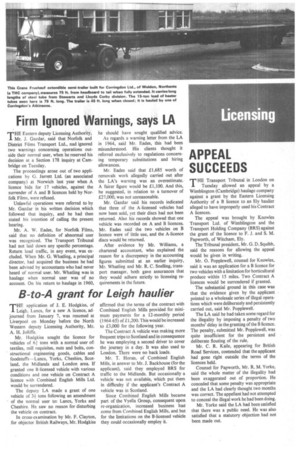B-to-A grant fo r Leigh haulier
Page 45

If you've noticed an error in this article please click here to report it so we can fix it.
THE application of J. E. Hodgkiss, of Leigh. Lanes, for a new A licence, adjourned from January 7, was resumed at Liverpool on Monday before the North Western deputy Licensing Authority, Mr. A. H. Jolliffe.
Mr. Hodgkiss sought the licence for vehicles of 6+ tons with a normal user of: textiles, mill requisites, nuts and bolts, constructional engineering goods, cables and foodstuffs—Lancs, Yorks, Cheshire, Scotland, the Midlands and London area. If granted one B-licensed vehicle with various conditions and one vehicle on Contract A licence with Combined English Mills Ltd. would be surrendered.
The deputy LA made a grant of one vehicle of 34 tons following an amendment of the normal user to: Lanes, Yorks and Cheshire. He saw no reason for disturbing the vehicle on contract.
In cross-examination by Mr. F. Clayton, for objector British Railways, Mr. Hodgkiss affirmed that the terms of the contract with Combined English Mills provided for minimum payments for a 12-monthly period (1964-65) of £1,200. This would be increased to £3,000 for the following year.
The Contract A vehicle was making more frequent trips to Scotland and in consequence he was employing a second driver to cover the journey in a day. It was also used to London. There were no back loads.
Mr. T. Horan. of Combined English Mills, in answer to Mr. J. Backhouse (for the applicant), said they employed BRS for traffic to the Midlands. But occasionally a vehicle was not available, which put them in difficulty if the applicant's Contract A vehicle was in Scotland.
Since Combined English Mills became part of the Vyella Group, consequent upon re-organization, increased business had come from Combined English Mills, and but for the limitations on the B-licensed vehicle they could occasionally employ it.




























































































































